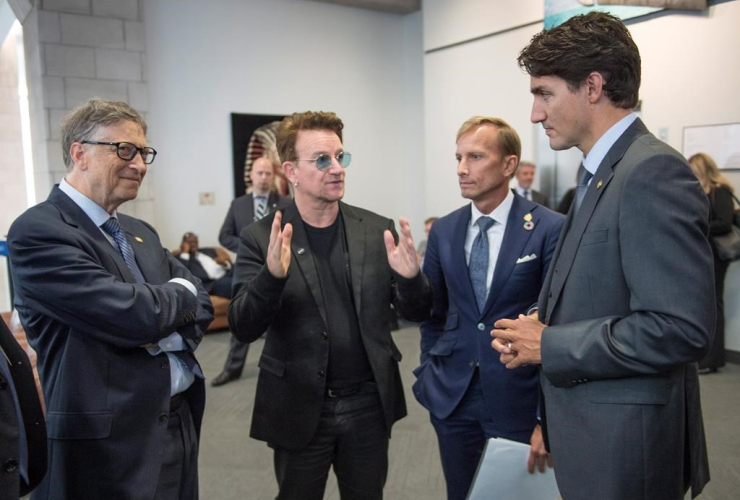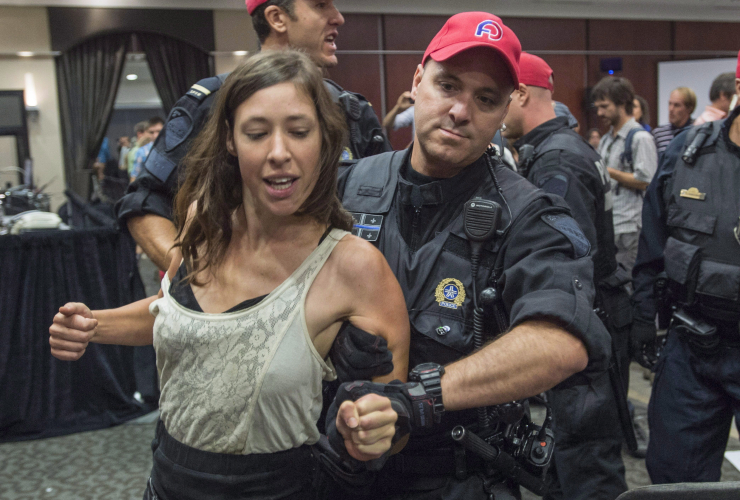Now for the hard part.
After 10 months of a prolonged honeymoon, consultations on dozens of difficult issues and soaring rhetoric that suggested anything is possible, Justin Trudeau's Liberal government faces a fall full of hard choices that will inevitably disappoint some of the prime minister's fans.
The rubber will start hitting the road Monday, with the return of Parliament after a 12-week summer break.
Among the most daunting challenges facing the government:
— Striking a national climate change strategy with the provinces to reduce greenhouse gas emissions. Environment Minister Catherine McKenna has insisted that putting a price on carbon will be part of the equation when first ministers meet, likely in November, but that will meet with some fierce opposition in oil-producing provinces, particularly Saskatchewan.
— Whether or not to approve Kinder Morgan's proposed Trans Mountain pipeline to carry Alberta oil sands crude to tidewater in Burnaby, B.C. A decision must be made by December.
Trudeau has repeatedly said it is the responsibility of the federal government to ensure Canada's natural resources can reach export markets. But he'll have to square that with his commitment to combat climate change and his promise not to proceed with projects that don't have "social licence" from affected communities and indigenous peoples.
— The Pacific NorthWest LNG (liquified natural gas) project, the fate of which the government must determine this fall and which is opposed by some B.C. aboriginal leaders and environmentalists, presents the same dilemma.
— How the government finesses the carbon pricing and pipeline issues could impact the Liberals in four byelections — three of them in Alberta — that Trudeau is expected to call soon.
— Negotiating a new health accord with the provinces. By the end of the year, the federal government wants a long-term funding agreement that targets improved home care, mental health services and palliative care and a pharmacare strategy. But provincial governments may be less eager to comply with federal priorities if they're not accompanied by adequate funding.
The Trudeau government has already signalled that it won't reverse the previous Conservative government's unilateral decision to tie the annual increase in health transfers to the provinces to GDP, scrapping the automatic six per cent annual escalator as of next year.
— Delivering on Trudeau's promise that last fall's federal election will be the last conducted under the first-past-the-post voting system. An all-party committee is supposed to recommend an alternative electoral system by Dec. 1 but, with each party looking to protect its own partisan interests, consensus may well prove impossible.
The Conservatives are vowing to stoke demands for a national referendum on any change. If their pressure tactics succeed, a referendum could wind up defeating any proposed change, as has happened in three provinces in the past, or at very least make it impossible to implement change before the next election in 2019.
The slew of hard choices comes against the backdrop of a stalled economy that is showing few signs of life.
Having already blown the election promise to run annual deficits of no more than $10 billion, the Liberal prescription for stimulating economic growth and bolstering the struggling middle class — massive investments in infrastructure, a new child benefit and a tax cut for middle income earners — has yet to demonstrate any traction.
Finance Minister Bill Morneau, who has been urging patience, is to deliver a fiscal update in November.
And on Nov. 14, Trudeau, along with Morneau and other ministers, will speak to major international investors at an elite Toronto summit organized by BlackRock, the world's largest asset manager. Government officials are billing it as a golden opportunity to drum up investments from some of the world's most prominent pension funds and portfolio managers.
But the Conservatives are in no mood to wait for government measures to begin bearing fruit. Starting Monday, they intend to hammer the government for what they deem are its failed economic policies.
"We have a Liberal government that is spending and spending and spending and planning on raising taxes," said newly appointed Tory House leader Candice Bergen, referring to the coming price on carbon, increased Canada Pension Plan premiums and the Liberals' decision to renege on a campaign promise to reduce the small business tax rate.
"The things that they're doing have been hurtful and are proving to be harmful to Canadians. Take for example, they promised a $10 billion deficit. It's clear it's going to be much, much more than that. No jobs created, we're seeing job losses, the unemployment rate going up. So, yeah, definitely we're going to hold them to account."
New Democrats are promising a similar line of attack, focusing on record levels of family debt, the erosion of good jobs, the housing affordability crisis and seniors living in poverty — "things that have gotten worse in the past year," said NDP House leader Peter Julian.
Given the availability of ammunition, the Liberals can be grateful that both opposition parties are embroiled in leadership races, which may blunt their attacks.
Nevertheless, the chances that toxic partisanship will poison the tone in the House of Commons — as it did last spring when the government tried to ram through a motion giving it unprecedented control over the legislative agenda — are high.
Bardish Chagger, the newly appointed government House leader, is promising to collaborate with opposition parties to "strike the right balance between having meaningful, constructive debate as well as advancing and implementing the mandate that Canadians gave to us."
It will be, she conceded, "a lot of hard work."
Liberal, Conservative and NDP priorities
Here's a look at the priorities the three main political parties have staked out and the challenges each faces in what has the potential to be a tumultuous fall sitting of the House of Commons:
LIBERALS
Priorities
- Stimulating the stalled economy and improving conditions for the middle class. That includes passing the bill formalizing a tax cut for middle income earners and the second part of the bill implementing last March's budget.
The government is also hoping the roll-out of funding for major infrastructure projects will boost the economy. It is also working on finalizing a free trade agreement with the European Union. And Prime Minister Justin Trudeau will make the case for investing in Canada to some of the most prominent international pension funds and portfolio managers at a Toronto summit on Nov. 14 organized by BlackRock, the world's largest asset manager.
- Striking an agreement with the provinces on a national climate change strategy, which is to include putting a price on carbon. A first ministers' meeting is expected in November.
- Finding consensus on reforming Canada's first-past-the-post voting system. An all-party committee is to report with a recommended alternative by Dec. 1. Trudeau has vowed that last fall's federal election will be the last conducted under FPTP.
- Negotiating a new long-term health accord with the provinces that focuses on a pharmacare strategy and improving home care, palliative care and mental health services.
- Deciding where to send Canadian peacekeepers. Trudeau has pledged to send up to 600 military personnel and 150 police officers to take part in United Nations peacekeeping missions.
Challenges
- A stubbornly stagnant economy, causing job losses and a rising unemployment rate.
- A host of thorny issues which require hard choices that will inevitably disappoint some segments of the population, including electoral reform, pipelines, climate change and how to proceed with the purchase of new fighter jets.
- The potential for getting knocked off message by events, such as the expenses controversy that has plagued Health Minister Jane Philpott and several other ministers over the summer.
CONSERVATIVES
Priorities
- Guarding taxpayers against the government's big-spending, high-deficit agenda and coming tax hikes in the form of carbon pricing and increased CPP premiums.
- Demanding a debate and vote on whatever peacekeeping mission(s) the government ultimately chooses to participate in.
- Demanding a national referendum on any change to the electoral system.
Challenges
- Keeping a coherent message and a united front in the midst of a leadership contest. That could prove difficult, as has been demonstrated by the controversy over leadership contender Kellie Leitch's proposal to screen prospective immigrants for "anti-Canadian values."
NDP
Priorities
- Pressuring the government to accept a new voting system based on proportional representation, in which a party's share of seats in the Commons would more accurately reflect its share of the popular vote.
- Holding the government to account for worsening economic conditions, particularly job losses, record levels of family debt, seniors living in poverty and the housing affordability crisis.
- Holding the government to account for its failure to deliver on promises to improve conditions for indigenous peoples, protect public health care and combat climate change.
Challenges
- Like the Tories, maintaining a coherent message and united front in the midst of a leadership race.
This is a more daunting challenge for the NDP due to slumping poll numbers, plummeting donations and ongoing misgivings by some New Democrats about Tom Mulcair remaining leader until a successor is chosen in October 2017. Mulcair survived an attempted coup last week but could face more efforts to push him out if the party's fortunes continue their downward spiral.





Comments